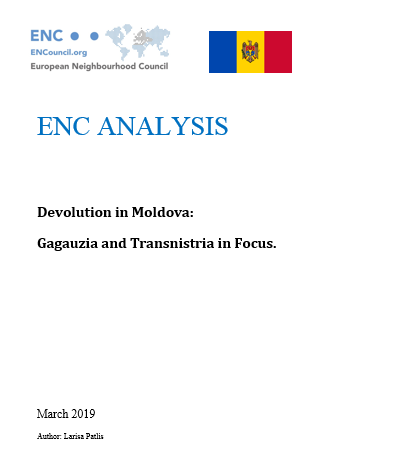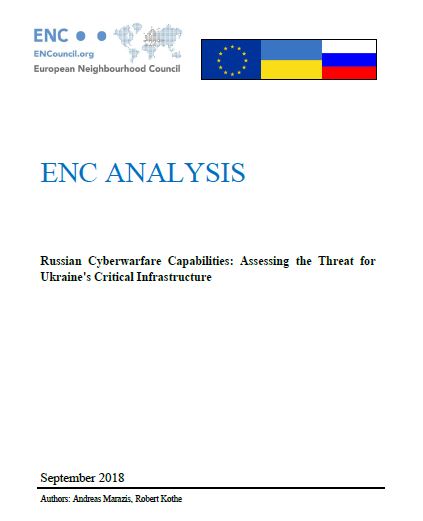



The European Neighbourhood Council (ENC) released its new analysis entitled “The Eastern Neighbourhood between Shifting Logics of Power”.
The ENC Analysis is written by Dr. Kevork Oskanian, ENC Academic Council Member and Honorary Research Fellow at the University of Birmingham, UK. This paper describes the recent evolution of the relations of power between the EU and its ‘Eastern neighbourhood’. The author argues that the european normative power has diminished in the region as it is facing severe challenges. The current crisis of liberalism has put the coherence of EU foreign policy under unprecedented threat, especially in relation to the Eastern partners, who he points out should prepare for a “worst-case” outcome of disengagement and increased incoherence.
The full analysis is available in the PDF version below.
 The Eastern Neighbourhood between Shifting Logics of Power
The Eastern Neighbourhood between Shifting Logics of Power

The European Neighbourhood Council releases its new analysis entitled “The New EU Strategy on Central Asia: Putting Renewable Energy on the Map”.
The ENC Analysis is co-authored by Andreas Marazis (ENC Head of Research for Eastern Europe and Central Asia) and Federico Ohle (ENC Research Assistant).
The study highlights a significant shift in focus towards sustainability and development of the renewable energy sector from the 2007 to the 2019 EU Central Asia Strategy. It provides an explanation of why this might be the case and recommends future courses of action for the EU and Central Asian states towards sustainable development, clean energy and climate change.

The full analysis is available in the PDF version below
 The New EU Strategy on Central Asia: Putting Renewable Energy on the map
The New EU Strategy on Central Asia: Putting Renewable Energy on the map

The European Neighbourhood Council (ENC) released its new analysis entitled “Devolution in Moldova: Gagauzia and Transnistria in Focus“
The ENC Analysis is authored by Larisa Patlis, ENC Academic Council Member, and Professor at Free International University of Moldova (ULIM), who focuses on the processes of decentralization and unresolved political conflict in Moldova with the separatist region of Transnistria which opens up new challenges for devolution.

The full analysis is available here.

The European Neighbourhood Council (ENC) released its new analysis entitled “Russian Cyberwarfare Capabilities: Assessing the Threat for Ukraine’s Critical Infrastructure“
This ENC Analysis is authored by Andreas Marazis, ENC Head of Research for Eastern Europe and Central Asia and Robert Kothe, ENC Research Assistant and identifies cyber threats coming from Russia targeting Ukraine’s critical infrastructure and explains how malicious software infiltrate and affect vital sectors including energy distribution, transport, banking, financial market, and drinking water supply. The final objective of the study is to provide recommendations with the aim to enhance the EU’s critical infrastructure cyber resilience, as well as Ukraine’s through cooperation including lessons learnt from each other.

The full analysis is available here

In their present article, ENC’s Managing Director Samuel Doveri Vesterbye and ALDE Vice President and Member of the European Parliament, Ilhan Kyuchyuk discuss the increased complexity of the migration issue. Based on the results of comprehensive research on European citizens, they reached a conclusion which offers three considerations for Europeans; an improved and shared European border control, a more coherent foreign and security policy, and a fair distribution of refugees among countries. Their opinion piece (op-ed) on the subject was published online on EurActiv.
Read the full article here: https://www.euractiv.com/section/global-europe/opinion/migration-can-only-be-tackled-by-the-eu-as-a-whole/

This ENC Analysis is authored by Samuel Doveri Vesterbye, Mykhailo Gonchar, Andreas Marazis and Vitalii Martyniuk. The European Neighbourhood Council and the Centre for Global Studies ”Strategy XXI”, with support of the NATO Information and Documentation Centre in Ukraine, organised the two-day conference on the 30-31 May 2018 in Kyiv. Based on the results of the conference, this report examines the EU-NATO cooperation in relation to Ukraine with the aim of further embedding the country’s security.

Samuel Doveri Vesterbye, ENC’s Managing Director, wrote an article on deteriorating EU-Turkey relations.
Turkey’s EU accession has lost its significance over the past decade. Today, distorted incentive mechanisms govern relations between Ankara and Brussels, often altering rational policymaking. It is in the interest of both sides that existing structures remain in place until better ones replace or complement them. In the meantime, change is necessary to correct outdated structures that encourage rivalry, and turn bilateral and multilateral relations with Turkey into uncalculated time bombs. Although migration and counter-terrorism play an important role, a new blueprint for a sustainable partnership necessitate a wider scope, including business support, trust, and respect for each sides’ priorities. A reformed Customs Union, energy cooperation, and coordination on geo-regional foreign policy areas like Iraq may prove useful.
The full article from the Turkish Policy Quarterly is available in PDF Format here.
Furthermore, the abridged version of the article is available here.

The European Neighbourhood Council (ENC) is glad to release the second analysis of the new feature “ENC Analysis“. The latter displays research by our Academic Council Members and External Advisors on relevant topics regarding the European Neighbourhood Policy (ENP) area and wider Europe.
This ENC Analysis features the opinion of Deniz Servantie on EU-Turkey relations and the roadmap to Visa Liberalization. The analysis looks back at the steps taken by the EU and Turkey from 2013 onwards and reflects on what is still to be achieved.
The full analysis is available in PDF format below.
 Turkey’s quest for Visa-Free Access to Europe
Turkey’s quest for Visa-Free Access to Europe

The European Neighbourhood Council (ENC) is glad to introduce a new feature entitled “ENC Analysis“. The latter will display analyses by our Academic Council Members and External Advisors on relevant topics regarding the European Neighbourhood Policy (ENP) area and wider Europe.
The first ENC Analysis features the study by Stepan Grigoryan, Tatev Matinyan and Hasmik Grigoryan which measures the Armenian public’s opinions on the European Union, NATO, the Eurasian Economic Union, and the Collective Security Treaty Organization (CSTO). The final objective of the study is to promote informed public debate within the country on Western values and institutions.
The full analysis is available in PDF format below.
 Analysis of Political Parties’ Policies and Public Sector Opinions in Armenia regarding the EU, NATO, CSTO, and the EEU
Analysis of Political Parties’ Policies and Public Sector Opinions in Armenia regarding the EU, NATO, CSTO, and the EEU